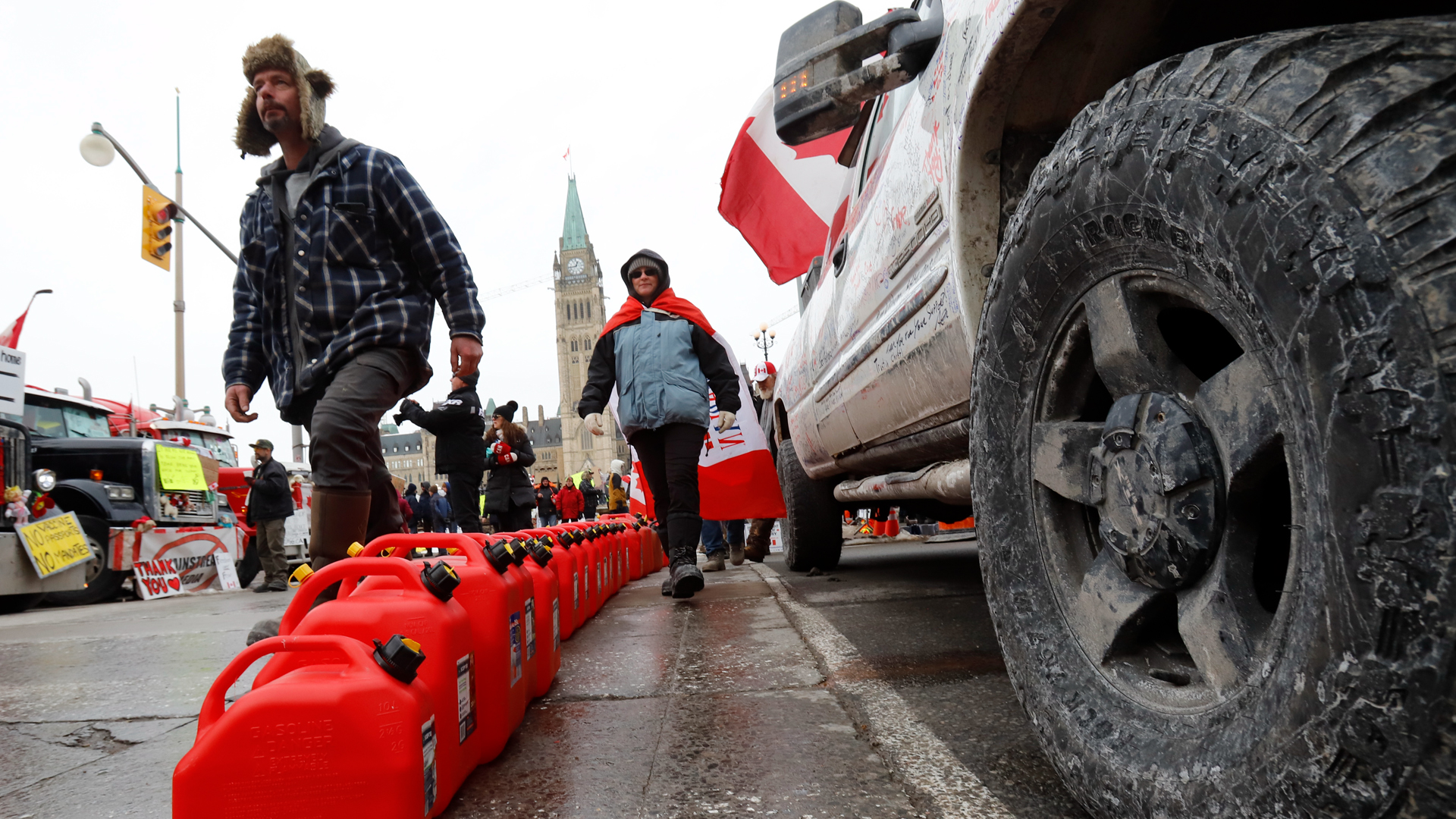
(Version française disponible ici)
The honking trucks, blaring megaphones, blocked-off streets and general sense of disorder around Parliament Hill during the convoy protests may be long behind us. But Canada’s legal community is just getting started on the Trudeau government’s use of the Emergencies Act to end that in February 2022. Even though the Rouleau Commission concluded that the government met the high threshold for invoking the act, whether the declaration of a public emergency was lawful is a question that is likely to occupy the courts for several years yet.
In early April, Justice Richard Mosley of the Federal Court heard arguments about whether the emergency declaration was consistent with administrative law principles and whether the measures enacted under the authority of the declaration were consistent with the Canadian Charter of Rights and Freedoms and the Canadian Bill of Rights. Several individuals and groups, including the Canadian Civil Liberties Association and the Canadian Constitution Foundation, challenged the lawfulness of the emergency declaration and associated measures.
With so much drama on Parliament Hill prior to, during and immediately after the emergency declaration, the subsequent legal wrangling has played out below the public and political radar. Lawyers for the challengers and the attorney general of Canada have been battling about a variety of important issues relating to what sort of material should be put before the court.
Justice Mosley is a vastly experienced judge who served at the upper echelons of the public service prior to his appointment to the bench. At hearings in early April, he asked probing questions of both the challengers and the attorney general.
One thing seems clear: Justice Mosley does not consider himself to be bound in any way, shape or form by the conclusions of the Rouleau Commission. Indeed, as he commented in deciding one of the procedural questions raised in Canadian Civil Liberties Association v. Canada (Attorney General), the Federal Court has “a duty to hear and rule on the judicial review applications” and it cannot “abdicate that responsibility.”
What does that mean in plain language? Unlike the Rouleau Commission, Justice Mosley will primarily be considering administrative law and constitutional law issues. So, too, will the Federal Court of Appeal if (as seems inevitable) the losing side appeals Justice Mosley’s eventual decision, which may eventually make its way before the Supreme Court of Canada.
These issues are both fascinating and challenging from a legal point of view, and they may end up having a very real impact.
Issues stemming from administrative law will be considered using the Supreme Court of Canada’s revamped framework, set out in detail in Canada (Minister of Citizenship and Immigration) v. Vavilov. This framework applies to all administrative decision-makers, big and small. Cabinet is no exception. In the years since Vavilov was decided, judges have heeded the Supreme Court’s message that decision-makers “must adopt a culture of justification,” making decisions that are not only justifiable but justified by reasoned analysis. In many cases, front-line officials, high-volume tribunals and government ministers exercising policy-laden discretionary powers have found the standards of Vavilov hard to meet.
The question for Justice Mosley will be whether cabinet’s reasons for the emergency declaration are justifiable given the legal and factual context. This will involve considering questions such as:
1. Did cabinet engage with the language and purpose of the act?
2. Did cabinet grapple with relevant evidence?
3. Did cabinet account for the significant consequences of invoking the act?
In particular, Justice Mosley will have to determine whether cabinet had “reasonable grounds” for invoking the act. This is not a test of whether cabinet believed, subjectively, there was a good reason for declaring an emergency. It was deliberately designed with a high threshold, requiring cabinet to demonstrate an objective rationale for an emergency declaration.
It is difficult to know exactly what test Justice Mosley will apply. In other contexts, a reference to “reasonable grounds” has been taken to require the presence of “compelling and credible information.” Whatever the precise test applied, Justice Mosley will closely parse the reasons provided to him to determine whether cabinet adequately justified recourse to the act. Eventually, the Federal Court of Appeal and, perhaps, the Supreme Court, will do the same.
Justification will be central to resolving constitutional issues as well. The measures made under the emergency declaration swept very broadly indeed: assemblies liable to lead to a breach of the peace were banned nationwide, and anyone financially supporting the protesters directly or indirectly committed an offence. As I noted at the time, the measures covered “everything from the individual (anywhere in Canada, or even abroad) sending money to support those participating in an unlawful assembly to the Quickie cashier who sells a can of propane to someone en route to an unlawful assembly.”
These were obvious breaches of the Charter rights to freedom of expression and association. In addition, financial institutions were obliged to freeze the accounts of anyone covered by these extremely broad measures. Moreover, there was no process for identifying whose accounts should be frozen or for unfreezing accounts wrongly frozen. This is probably a breach of the Charter protection from unreasonable searches and seizures.
Breaches of the Charter can, however, be justified. These breaches were undoubtedly serious and will certainly focus the minds of anyone planning a mass protest in Canada in the future. But they turned out to be time-limited. Justice Mosley will have to consider whether a serious Charter breach can be justified due to its temporary nature.
READ MORE FROM THE SERIES:
The “failure of federalism” at the siege of Ottawa was primarily a failure of governance
The Rouleau report and the politics of living next to a powerful neighbour
Lastly, the Canadian Bill of Rights, which has been overshadowed by the Charter in recent decades, may be relevant in determining whether the emergency economic measures were lawful. Unlike the Charter, the Bill of Rights protects property interests and guarantees due process for the determination of “rights and obligations.”
Justice Mosley has been asked to find that the Bill of Rights narrows the scope of the Emergencies Act, preventing cabinet from using the act to impose measures that interfere with property (such as money in bank accounts) without due process. If this argument succeeds, new life will be breathed into the Bill of Rights, which has foundered on the periphery of the Canadian legal consciousness.
With these important questions of administrative law and constitutional law to resolve, the Trudeau government’s use of the Emergencies Act in 2022 will keep lawyers and courts in Canada busy on questions that may ultimately guide the decision by future governments about whether and, if so, how to use it again.
This article is part of the Lessons from the Rouleau Commission special feature series.










